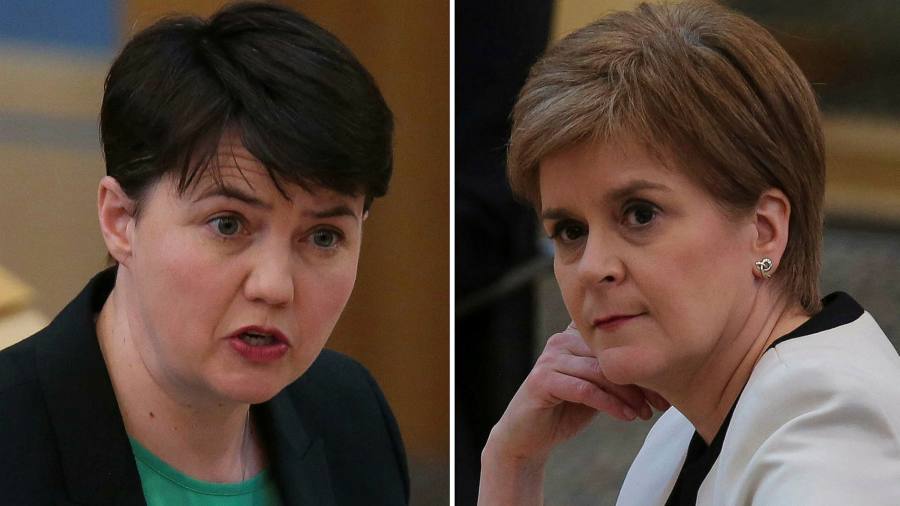[ad_1]
Scotland’s first minister Nicola Sturgeon was on Thursday accused of presiding over a “culture of secrets and cover-up†amid an escalating political crisis for her governing Scottish National party.
Ruth Davidson, Conservative leader in the Scottish parliament, said Sturgeon’s handling of the fallout from complaints of sexual harassment against her predecessor as SNP leader Alex Salmond was damaging the Scottish government’s reputation and diminishing parliament.
“[There is] a culture of secrets and cover-up that is only growing, and it is all taking place on Nicola Sturgeon’s watch,†Davidson said.
Davidson’s comments follow claims by Salmond that associates of Sturgeon plotted to remove him from public life and that there had been a “complete breakdown†of the barriers between government, political party and prosecutors in Scotland.
The dispute between the current and former SNP leaders is set to rise to a crescendo on Friday when Salmond appears before a parliamentary committee investigating the government’s handling of the harassment complaints against him. Sturgeon is expected to face the committee next Wednesday.
The rift has fuelled increasingly open division within the SNP and threatens to undermine its chances of winning a majority in the Scottish parliament at elections scheduled for May.
The UK government of Boris Johnson hopes a setback for the SNP could help stall its push for Scottish independence and help preserve a 313-year-old union with England that has been under growing strain in recent years.
One poll, published on Thursday but conducted before this week’s dramatic escalation of the Salmond-Sturgeon feud, suggested the SNP was on course for a landslide in May but that the dispute was beginning to turn some voters away from the party.
The Scottish Conservatives, the largest opposition group in Holyrood, have seized on Salmond’s claim that the Crown Office public prosecution service has sought to prevent crucial evidence being considered by the committee investigating the handling of the complaints against him.
In 2019, the Scottish government accepted its investigation into harassment complaints against Salmond by two female civil servants was “tainted by apparent biasâ€. At a separate criminal trial last year, Salmond was acquitted of all 13 charges of sexual offences against him.
The Scottish parliament on Tuesday redacted parts of an already-published submission from Salmond that included details of what he says are breaches by Sturgeon of the ministerial code. James Wolffe, Scotland’s Lord Advocate and head of the Crown Office, has said prosecutors’ sole interest was ensuring the court-ordered anonymity of Salmond’s accusers is respected.
But the Scottish Conservatives have accused the Crown Office of “strong-arming parliament and suppressing evidence — not to protect victims’ identities — but to protect Nicola Sturgeonâ€.
Sturgeon dismissed suggestions her associates plotted against Salmond, saying talk of a cover-up or political influence on prosecutors was a “litany of nonsenseâ€.
“It used to be possible in this country to have rigorous, robust scrutiny and political debate without a scorched earth policy of conspiracy theory and damaging the integrity of the independent institutions of the country,†the first minister said.
“What is poisoning our democratic institutions . . . is politicians standing up and hurling assertions and accusations without a shred of evidence to back them up,†she said.
Polling company Ipsos Mori said on Thursday there were signs the inquiry into the handling of the complaints against Salmond had begun to have an impact.
The Ipsos Mori poll conducted for broadcaster STV in the week to Sunday found 36 per cent of Scottish voters felt the inquiry has made them “less favourable†towards the SNP.
But the poll found a hefty 52 per cent of voters were still likely to give their constituency vote to the SNP in May. Scottish voters willing to express an opinion backed independence by 52-48 per cent, Ipsos Mori said, a narrower lead than the 56-44 per cent recorded in November.
[ad_2]
Source link






